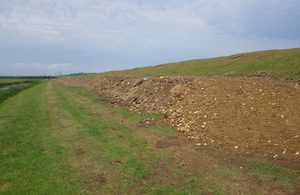
A waste company, one of its directors and a tenant farmer involved in the illegal deposit of waste on protected land in an Essex village have been ordered to pay a total of £19,430.
Chelmsford Magistrates’ Court heard that 3,920 tonnes of inert waste was deposited on land at Little Hayes Farm, Stow Maries, breaching a waste exemption. The work was also carried out without a flood defence consent or permission from Natural England. The area is within an environmentally sensitive area which benefits from protection as a Site of Special Scientific Interest (SSSI), a Special Protection Area, a Special Area of Conservation and RAMSAR site.
Chelmsford Magistrates’ Court heard that the site did not comply with the U1 exemption which only allows 1,000 tonnes of soil and stones to be used for construction purposes. Almost 4 times this amount was deposited onto the land between 15 April and 8 May 2015, before the activity was stopped by Natural England and the Environment Agency.
On Thursday 3 August, 2017 Simon Hollington pleaded guilty to knowingly causing the illegal deposit. T J Cottis Transport Limited and Jedd Cottis (a director of the company) both pleaded guilty to depositing the waste without an environmental permit and failing to comply with duty of care requirements.
Mrs Miriam Tordoff, prosecuting for the Environment Agency, told the court the waste was deposited there in an attempt to strengthen the existing flood defence at this location. The material used was construction and demolition waste from development sites and T J Cottis Transport Ltd.’s own permitted waste treatment facility. The waste consisted of mainly soil and stones but also included concrete, brick, plastic, glass, wood and plasterboard. It was not suitable for the construction of flood defences.
Mr Hollington employed T J Cottis to deliver waste to land at Little Hayes Farm, Stow Maries. The company paid Mr Hollington £4,800 to deposit the waste. The company accepted that they saved £24,000 in landfill charges by depositing the waste on Mr Hollington’s land.
Mrs Tordoff explained that following the Environment Agency’s request to remove the waste Mr Hollington had now applied for an environmental permit to do this. The waste is expected to be removed later this year.
After the hearing Environment Agency enforcement team leader Lesley Robertson said:
This case highlights to landowners that risk taking is not acceptable, whether it is a risk that concerns human health or the environment. Owning a piece of land means accepting a responsibility to the surrounding area and all that resides there, be it business, homes or wildlife.
If you want to operate under a waste exemption you must register that exemption with the Environment Agency. Each registration lasts 3 years and will then expire unless you re-register. Each exemption has specific limits and conditions you need to operate within. If you don’t, you will not be exempt from needing a permit and may face enforcement action.
Registering an exemption does not remove the need to apply for other permits or permissions. For example, you may need planning permission for your waste operation. You can find out more on the GOV.UK website at environmental permits.
This prosecution follows extensive work with Natural England.








